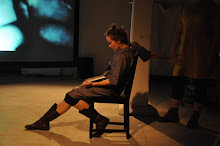I fell for it. No, I TOTALLY fell for it.
The MCA press for its Lucinda Childs show last weekend advertised not "Lucinda Childs Dance" or "Lucinda Childs, Adapted, Updated" but "Lucinda Childs." Period. And the only accompanying photo on their website is a lithe Lucinda Childs doing something extremely cool with her arms that I can't reproduce. (I tried.) I don't mean to accuse the MCA of false advertising, but they really had me: I thought, despite her being 70 years old, Lucinda Childs herself was going to walk up on the stage and dance. And come on: I'm not insane. Dancers age better than the rest of us. Look at frigging Baryshnikov! But I should have known. There's an age at which respectable artists of all stripes stop publishing photographs of their current selves and use the same one indefinitely. Lucinda looks a little too gorgeous in the photo to be 70. But then, who knows? It seemed to me at least plausible that if she were 70, and that picture had been snapped when she was 60 (it's a stretch, but not totally ridiculous) it might be the case that the show was not just a showcase of her work, but that Lucinda would appear in the flesh. And in a way she did.
"Dance" is a reconstruction commissioned by the Richard E. Fisher Center at Bard. The original piece (1979) comprises three 20-minute pieces with music by Philip Glass. Rather than simply reenacting the piece and having done with it, the creative team last weekend thought it would be a good idea to project a live recording of the original, 1979 version on top of the live dancers. A very, very thin scrim divided the audience from the stage making this possible. The video was rarely in sync with what was going on onstage and the projected dancers were also very, very large by comparison so that they dwarfed the live performers.
Childs' choreography Mickey Mouses Glass's music. (Translation: it's repetitive.) 20 minutes kinda crawls. The problem wasn't that the dance was boring. In fact, the video projected dance was riveting. If the MCA had shown an hour of the video only (by Sol LeWitt) I would have left, a happily paying customer. The problem was the discrepancy between the live and the video-projected dancers. On the video (which included a breathtaking solo dance by Lucinda for Lucinda), Childs' choreography worked. It was repetitive, but in a good way, because the ingenuity of the movements bear repeating. The dancers are poised on a giant grid, 12X12 squares. They skip along the grid at breakneck speed as though it were propelling them along. LeWitt's camera follows the dancers, making it seem as if they're actually hopping up and down in place on a moving sidewalk. The effect is a bit like Irish dancing, to use a terrible comparison -- the torso stays totally upright; the feet do all the work. Childs' facial expression in her own dancing is also unusual--rather than looking out at an imagined audience, she looks inward. She's doing this dance for herself and we're incredibly lucky to catch her in the act. I almost felt voyeuristic watching the video. But the live dancers on Friday dispensed with everything that made the original dancers so unearthly. Theses were rule-bound, balletic, posed. Less skittish, more robust, more effortful. They looked like they were trying very, very hard.
In case you'd rather hear it from someone who actually knows something about dance, read the Laura Molzahn review in the Trib.
Subscribe to:
Post Comments (Atom)




No comments:
Post a Comment